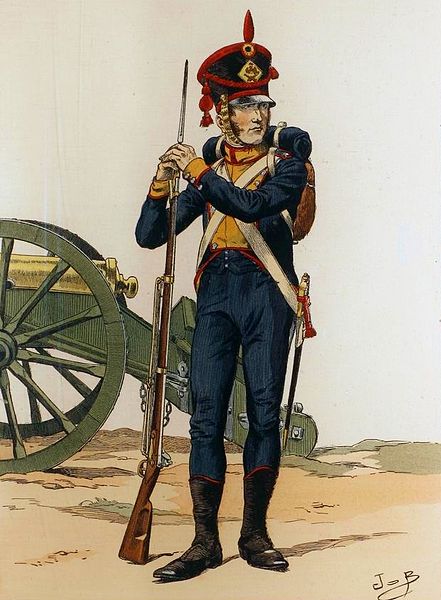From soldier of the King to soldier of the Nation
From the war between kings to the war between peoples

Artilleryman of the Neuchâtel battalion, 1810 – Wikimedia commons
In the society of the Ancien Régime, the soldier did not fight only for pay but also for honor, which was a key principle of all European absolutist monarchies. Honor was not only for aristocratic officers but also for infantrymen; it was a concept linked to a sense of belonging to a particular regiment, to the King's army, to the role being undertaken. In addition to honor and pay, there were also a series of benefits such as tax exemptions, honorable seats in religious liturgies, prestigious honors, and the right to carry a sword, even if not noble, therefore also a matter of status. These principles formed the basis of European professional armies for centuries and required time to strengthen, but it only took about three decades (1793-1815) to dismantle them. With the French Revolution and the Revolutionary Wars, France found itself surrounded by enemies, necessitating the creation of a large army to address the crisis. The revolutionaries initially had an insufficient force at their disposal, made up of few volunteers mainly from the bourgeoisie. In 1793, France introduced the "levée en masse", calling all citizens to arms. With this act, soldiers no longer fought for a sense of honor but for the nation. The compulsory conscription of 1793 was itself a revolutionary act, and Clausewitz observed that war "suddenly became a matter for the people". From that moment on, large armies of citizens with political rights began to gain ground, replacing small professional armies linked by honor and loyalty to the sovereign.
- Sconfienza Roberto, Fortificazione campale e ordini di battaglia-un esempio piemontese del 1743, “Nuova Antologia Militare – Rivista Interdisciplinare Della Società Italiana di Storia Militare”, N.2, Issue 7, June 2021
- Arielli Nir and Collins Bruce, Transnational Soldiers-Foreign Military Enlistment in the Modern Era, Palgrave Macmillan, 1° edition, 2013
2025-02-22
Salvatore Ciccarello
